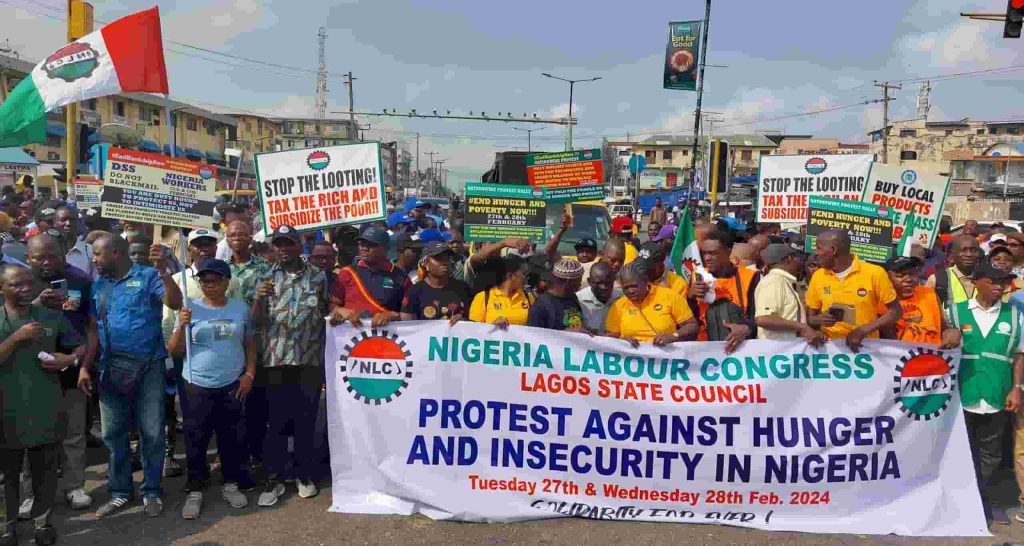Protest is Legal, but is it Transformational for a Nation? The Nigeria Analysis
Protests have long been a critical component of democratic societies, serving as a platform for citizens to voice their grievances, demand justice, and advocate for change. In Nigeria, a country with a rich history of civil activism, protests have played a significant role in shaping political and social landscapes. However, while protests are undeniably legal and often necessary, the question arises: Are they truly transformational for the nation?
While protests are undeniably legal and a crucial part of democratic expression, their transformational impact on the nation warrants a closer examination. This analysis delves into the nature of protests in Nigeria, assessing their effectiveness in bringing about lasting change.

The Legality of Protests in Nigeria
The right to protest is enshrined in the Nigerian Constitution, which guarantees freedom of expression and assembly. This legal backing has empowered Nigerians to mobilize against injustices and hold the government accountable. In Nigeria, the right to protest is enshrined in the 1999 Constitution, specifically in Section 40, which guarantees every Nigerian the right to assemble freely and associate with others.
These provisions align with international human rights standards, allowing citizens to voice their grievances and demand accountability from their leaders. However, the reality on the ground often involves a complex interplay of legal rights, state response, and public perception. Over the years, protests have addressed various issues, from electoral reforms and corruption to police brutality and economic policies. Despite these provisions, the implementation of the law has frequently been contentious, with allegations of excessive force and restrictions by security agencies.
One of the most notable movements in recent history is the #EndSARS protest, which began in October 2020. What started as a call to disband the Special Anti-Robbery Squad (SARS), notorious for human rights abuses, quickly evolved into a broader demand for police reform and good governance. The protest drew national and international attention, highlighting the power of collective action
The Impact of Protests on Nigerian Society
Protests in Nigeria have undoubtedly brought about some positive changes. For instance, the #EndSARS movement led to the disbandment of SARS and initiated discussions on police reform. Additionally, protests have often raised awareness about critical issues, galvanizing public opinion and putting pressure on authorities to act.
However, the transformational impact of protests on the nation remains a subject of debate. While they can lead to immediate changes, such as policy adjustments or the removal of public officials, their long-term effectiveness in driving systemic transformation is less clear. Several factors contribute to this complexity:
Government Response: The Nigerian government’s response to protests has been mixed. While some administrations have shown willingness to engage with protesters and address their concerns, others have responded with repression and violence. This inconsistency can undermine the potential for lasting change.
Sustainability of Movements: Sustaining the momentum of protest movements is challenging. Initial enthusiasm often wanes over time, and without effective leadership and organization, movements can lose direction. The #EndSARS protest, for example, faced difficulties in maintaining its momentum and achieving all its objectives.
Structural Barriers: Deep-seated structural issues, such as corruption, weak institutions, and socio-economic inequalities, require more than just protests to resolve. While protests can highlight these problems, addressing them necessitates comprehensive reforms and sustained efforts from various stakeholders, including the government, civil society, and international partners.
Case Studies or Historical Contexts: Transformative Protests in Nigeria
The history of protests in Nigeria is marked by significant events that have shaped the nation’s socio-political landscape. From the anti-colonial movements of the early 20th century to the nationwide protests against military rule in the 1990s, Nigerians have repeatedly taken to the streets to demand change. More recent examples include the Occupy Nigeria protests of 2012 against fuel subsidy removal and the #EndSARS protests of 2020, which called for an end to police brutality.
To understand the potential of protests to transform a nation, it is essential to examine specific case studies within the Nigerian context:
#EndSARS Movement:
A youth-led protest against police brutality, particularly targeting the Special Anti-Robbery Squad (SARS). This movement not only highlighted police misconduct but also broader issues of governance and youth disenfranchisement. As previously mentioned, the #EndSARS protest marked a significant moment in Nigerian history. The movement’s ability to mobilize millions, both online and offline, showcased the power of digital activism and grassroots organizing. While the disbandment of SARS was a victory, the broader goals of police reform and accountability remain works in progress. The movement’s impact on raising awareness and sparking conversations about governance cannot be understated.
Occupy Nigeria (2012):
This protest emerged in response to the government’s removal of fuel subsidies, which led to a sharp increase in fuel prices. The nationwide protests forced the government to partially reinstate the subsidies and prompted discussions on economic policies and governance. However, the long-term economic challenges persist, highlighting the limitations of protest-induced changes.
The “Ali Must Go” Protests (1978):
Students nationwide protested against increased university tuition fees, leading to reforms in the educational sector.
June 12 Protests (1993):
Following the annulment of the presidential election on June 12, 1993, which was widely considered to be free and fair, protests erupted across Nigeria. The prolonged struggle for the recognition of the election results eventually contributed to the end of military rule and the transition to democratic governance in 1999. This case underscores the potential of sustained protests to drive significant political transformations.
The Aba Women’s Riot (1929):
One of the earliest recorded protests, where women in Eastern Nigeria protested against colonial taxation and policies, highlighting the power of collective action.
The Path Forward: Beyond Protests
While protests are a vital expression of democratic rights and can catalyze change, they should be part of a broader strategy for transformation. For Nigeria to achieve lasting progress, several complementary actions are necessary:
Institutional Reforms: Strengthening institutions to ensure accountability, transparency, and the rule of law is crucial. This includes reforming the judiciary, law enforcement agencies, and anti-corruption bodies.
Civic Engagement:
Encouraging continuous civic engagement and participation in governance beyond protests. This can involve advocacy, community organizing, and participation in electoral processes.
Policy Development:
Developing and implementing policies that address the root causes of societal issues. This requires collaboration between government, civil society, and the private sector.
Societal Awareness, Mobilization and Education:
Promoting education and awareness about civic rights and responsibilities. An informed and empowered citizenry is better equipped to demand and sustain positive changes. Protests elevate public awareness about critical issues, galvanizing communities and fostering a culture of civic engagement. The Occupy Nigeria movement, for instance, brought widespread attention to economic policies and corruption.
International Attention and Support:
Leveraging international support and partnerships to bolster domestic efforts for reform and development. Protests can attract international attention, bringing global pressure on local governments to address the grievances of their citizens. The #EndSARS movement received significant international solidarity, highlighting global concerns about human rights in Nigeria.
Assessing the Impact of Protests
Short-Term Outcomes
Protests in Nigeria often achieve immediate outcomes, such as drawing attention to specific issues and forcing government responses. The #EndSARS protests, for example, led to the disbandment of the Special Anti-Robbery Squad (SARS) and initiated broader discussions on police reform. Similarly, the Occupy Nigeria movement temporarily halted the removal of fuel subsidies, highlighting the power of collective action.
Long-Term Transformational Change
While protests can bring about short-term victories, their ability to effect long-term transformational change is more complex. Sustainable change often requires institutional reforms, legislative action, and shifts in public attitudes—processes that extend beyond the immediate impact of protests. The challenge lies in translating the momentum of protests into enduring reforms that address the root causes of discontent.
The Limits of Protest
While protests can be catalysts for change, they are often insufficient on their own. Several factors can limit their impact:
- Organized civil society: Strong civil society organizations can provide the infrastructure for sustained activism and advocacy. Collaboration with civil society organizations can enhance the strategic planning and sustainability of protests, ensuring that demands are translated into actionable reforms.
- Legal and political advocacy: Pursuing legal challenges and engaging with policymakers can lead to systemic changes. Leveraging the outcomes of protests to advocate for policy changes and institutional reforms can drive long-term transformation.
- Voter mobilization: Encouraging citizens to participate in elections and hold elected officials accountable.
- Economic empowerment: Addressing underlying socio-economic inequalities that fuel unrest.
- Digital Activism: The rise of social media and digital activism provides new avenues for organizing, mobilizing, and amplifying protest movements, demands and sustain efforts.
Factors Influencing Transformational Impact
- Leadership and Organization
Effective leadership and organization are crucial for sustaining the impact of protests. Movements with clear objectives, strategic planning, and strong leadership are more likely to achieve lasting change. The lack of centralized leadership in the #EndSARS protests, while initially a strength in preventing co-optation, also posed challenges in maintaining focus and negotiating with authorities.
- Government Response and International Alignment of Demands
The response of the government plays a significant role in determining the transformational impact of protests. Constructive engagement and willingness to implement reforms can amplify the positive outcomes of protests. Conversely, repressive measures and failure to address underlying issues can lead to a cycle of unrest and erosion of public trust.
- Public Support and Solidarity
Broad-based public support and solidarity enhance the legitimacy and impact of protests. When diverse segments of society unite around common causes, the pressure on authorities to respond constructively increases. Protests that resonate with the broader population and align with their aspirations are more likely to drive meaningful change.
Conclusion
Protests are a vital and legal means for Nigerians to express their grievances and demand change. While they have achieved notable short-term successes, the transformational impact of protests on the nation depends on various factors, including leadership, government response, sustainability of movements, and the ability to address structural issues and public support. For protests to drive lasting change, there must be a concerted effort to address underlying issues through institutional reforms and sustained advocacy.
By harnessing the power of collective action and ensuring strategic engagement, protests can indeed become a catalyst for transformational change in Nigeria. For protests to lead to lasting transformation, they must be part of a comprehensive strategy that includes institutional reforms, continuous civic engagement, and collaborative efforts to address the root causes of societal challenges. By combining the power of protests with these broader initiatives, Nigeria can move towards a more just, equitable, and prosperous future.
References
- Coombs, W. T. (2015). Ongoing Crisis Communication: Planning, Managing, and Responding. Sage Publications.
- Fearn-Banks, K. (2016). Crisis Communications: A Casebook Approach. Routledge.
- Fink, S. (2013). Crisis Communications: The Definitive Guide to Managing the Message. McGraw-Hill.
- Gillin, P. (2010). Social Media Crisis Management. Quill Driver Books.
- Kruk, M. E., Freedman, L. P., Anglin, G. A., & Waldman, R. J. (2015). Rebuilding health systems to improve health and promote statebuilding in post-conflict countries: A theoretical framework and research agenda. Social Science & Medicine, 70(1), 89-97.
- Mitroff, I. I. (2004). Crisis Leadership: Planning for the Unthinkable. John Wiley & Sons.



